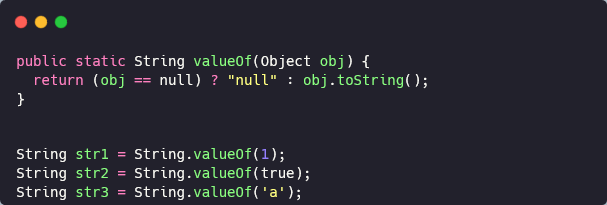Java | Constructors vs Static Factory Methods

“Consider static factory methods instead of constructors” ~ Joshua Block’s, Effective Java
While using constructors is the default way of creating new objects, using static methods might bring more advantages according to Joshua Block’s Effective Java Item-1.
Using Static Methods Instead of Constructors!
- Controlling the way of creating new objects seems to be a best practice to be considered when programming.
-
One of these ways is static factory method, which is simply a static method returning an instance of a class.
- Java API has many examples of classes using static factory methods e.g. String class
public static String valueOf(Object obj) {
return (obj == null) ? "null" : obj.toString();
}
String str1 = String.valueOf(1);
String str2 = String.valueOf(true);
String str3 = String.valueOf('a');
Some Advantages of using Static Factory Methods
1. Meaningful Names
- Unlike constructors, static factory methods can have meaningful names which describe the functionalities. For example,
Optionalclass has static factory method empty() that, as the name conveys, return an empty instance.
public static<T> Optional<T> empty() {
@SuppressWarnings("unchecked")
Optional<T> t = (Optional<T>) EMPTY;
return t;
}
- Also, static factory methods will help to get around the restriction of having multiple constructors with the same signature.
public class User {
private String name;
private String address;
private String type;
public User(String name, String address, String type) {
this.name = name;
this.address = address;
this.type = type;
}
public static User createUserwithDefualtType(String name, String address) {
return new User(name, address, "Regular");
}
public static User createUserwithEmptyAddress(String name, String type) {
return new User(name, "", type);
}
}
2. Instance Controlled Classes
- Controlling the creation of new instances is achievable with static factory methods.
- Immutable classes can be preconstructed or cached and return them with every invocation without recreating them.
- Static factory methods allow classes to be singleton, non-instantiable and to provide logic to be implemented before returning fully-initialized objects e.g. to check for duplicated instances.
public class Connection {
private static volatile Connection instance = null;
private Connection(String host, String address) {...}
public static Connection getSingletonInstance(String host, String address) {
if (instance == null) {
synchronized (Connection.class) {
if (instance == null) {
instance = new Connection(host, address);
}
}
}
return instance;
}
}
3. Returning Subtypes
- Unlike constructors, static factory methods can return subtypes of the return type.
interface Shape {
public static Shape createRectangle(int width, int height) {
return new Rectangle(width, height);
}
public static Shape createSquare(int length) {
return createRectangle(length, length);
}
public static Shape createCircle(int radius) {
return new Circle(radius);
}
}
public class Rectangle implements Shape {
private int width;
private int height;
public Rectangle(int width, int height) {
this.width = width;
this.height = height;
}
}
public class Circle implements Shape {
private int radius;
public Circle(int radius) {
this.radius = radius;
}
}
4. Basis of Service Provider Frameworks
- Static factory methods do not need the actual implementation of the returned object to exist immediately!
- This is clear when using service provider frameworks where actual implementation of a service interface does not need to exist at the compile time.
public interface MyService {
void doSomething();
}
class MyServiceFactory {
public static MyService getService() throws InstantiationException, IllegalAccessException, ClassNotFoundException {
return (MyService) Class.forName("MyServiceImplemetation").newInstance();
// MyServiceImplemetation is not written yet! But the code compile
}
}
public class App {
public static void main(String[] args) {
MyServiceFactory.getService().doSomething();
//...
}
}
class MyServiceImplemetation implements MyService{
@Override
public void doSomething() {
System.out.println("doing something!");
}
}